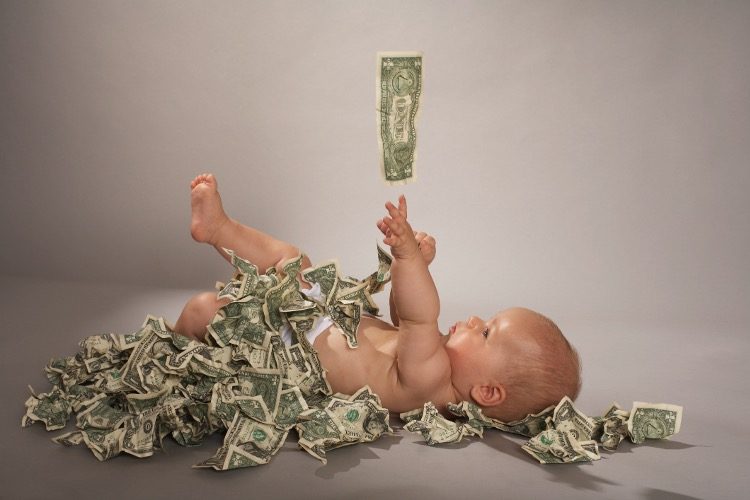
Not content to indoctrinate kids in socialism during their years in public schools, a group of Baltimore teachers and assorted other leftists wants to teach them its alleged virtues from the moment they’re born by supplying new parents with a $1,000 “baby bonus” from the public treasury.
The Bonus Fund
The Baltimore Baby Bonus Fund campaign, whose progressive bona fides are easily established by the fact that its leaders feel compelled to state their preferred pronouns, “recently secured the necessary 10,000 signatures” to put a city-charter amendment establishing the transfer payment on the November ballot, according to The Associated Press.
“We see the impact of child poverty on our students every day, and so we’ve been advocating at the state level for the state to implement policies to reduce child poverty, and we haven’t had a lot of success,” high-school math teacher Nate Golden, president of the Maryland Child Alliance, told WBAL.
Golden and his comrades therefore redirected their efforts toward the Baltimore Baby Bonus, which requires the Baltimore City Council to set aside at least 0.03 percent of the assessed value of all property in the city each year to give to parents of newborns. The minimum bonus is $1,000. With about 7,000 children born in Baltimore every year, that comes to an annual outlay of at least $7 million, or about 0.16 percent of the city’s annual budget.
“If we’re going to spend a limited amount of money, where do you get the most bang for your buck? Research says at birth,” Golden told AP. “This could literally have a lifelong impact on a kid.”
Reducing Childhood Poverty?
Childhood poverty is certainly a problem in Baltimore, “where,” AP wrote, “an estimated 31% of school-aged children are experiencing poverty, according to census data.” But is a one-time payment of $1,000 upon birth going to make much of a dent in it?
“For a family who is living on the brink of poverty, a $1,000 cash infusion during this very intense, very stressful time in their lives with a new baby can be make or break,” Baltimore Baby Bonus Fund campaign media chair Julia Ellis told WBAL.
Campaign manager Emily Yu went even further, telling the station, “Even if it doesn’t seem like a lot of money, the $1,000 can lead to better education outcomes, better life outcomes, job outcomes and health outcomes.”
In reality, wealth redistribution has never led to anything but greater poverty — witness the failure of President Lyndon Johnson’s War on Poverty — but leftists continue to stump for it just the same.
Just the Beginning
Don’t think they’re content with a mere $1,000, either. Johns Hopkins University associate economics Professor Christina DePasquale told AP that “the initiative will raise awareness about childhood poverty and could lead to more comprehensive changes down the road.”
“It’s worthwhile in the sense that it gets people thinking about it,” she said. “It’s something to build off of. Even if you don’t have something perfect, the less perfect version of it is better than not having it at all.”
Indeed, baby-bonus boosters are quick to point out that the amendment merely sets a floor of $1,000. It also requires the city to determine the annual bonus amount by considering “all relevant data,” such as “surplus monies in the fund, historical birth rates, [and] estimated future property values.” Under such calculations, they expect the bonus to more than double after the first year.
Who Pays? Who Receives?
At the same time, they claim the program won’t cause tax hikes. But what happens when bonus outlays exceed estimates or other programs compete for the same dollars? Unlike the federal government, the city of Baltimore can’t just whip up its own cash to fund its bloated budget.
For a program supposedly aimed at eradicating poverty, the baby bonus doesn’t seem overly concerned with who is on the receiving end. It employs no means test, which “means some of the money goes to affluent parents who don’t need assistance, but Golden said it’s worth including them to avoid leaving out the poorest families,” reported AP.
“We’ve come to find that having a ‘means test’ or testing for income eligibility is a huge administrative burden, it’s really cost inefficient, and there’s a high likelihood that we end up missing families,” Yu told WBAL.
DePasquale concurred, saying that “researching and developing a qualification system could add significant costs and delay implementing the program.”
WBAL interviewed some city residents who were all for the program.
“I think it’s a great idea if you’re going to help the parents that are with child,” said Wanda Norman.
“It would help the mother, it would help the family, it would help the newborn — I don’t see any reasons why not,” said Angela Sriram.
These folks, if they were not already convinced of the wonders of the welfare state, may have been won over by what AP described as the baby-bonus campaign’s “extensive canvassing efforts” and its “cute logo: a flying cartoon stork with a bag of money in its beak.”
That logo, however, is more than just “cute.” It’s an apt metaphor for the baby-bonus program, whose promise of money for nothing is just as fanciful as the notion that storks deliver babies out of the blue.



